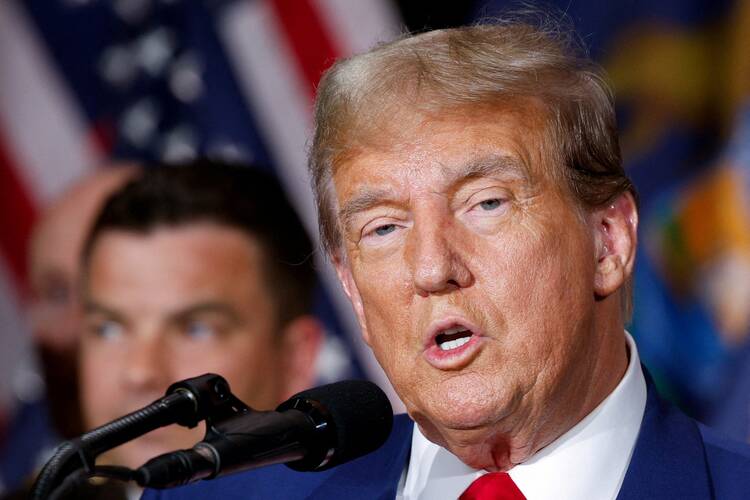WASHINGTON (OSV News) – Following his declaration that states should have authority over abortion legislation, former President Donald Trump criticized pro-life opponents of this stance on his social media platform.
Initially advocating for states to decide on abortion during his third bid for the presidency, Trump later contemplated supporting a federal abortion limit after 16 weeks gestation, diverging from a pro-life group’s call for a 15-week restriction. However, in an announcement on April 8, Trump expressed a preference for leaving the issue to states rather than Congress.
This decision drew backlash from pro-life advocates, including Marjorie Dannenfelser, the president of Susan B. Anthony Pro-Life America. Dannenfelser, a Catholic, expressed disappointment in Trump’s position, stating, “We are deeply disappointed in President Trump’s position.”
Senator Lindsey Graham, R-S.C., also disagreed with Trump’s assertion that abortion is solely a states’ rights matter, emphasizing the pro-life movement’s focus on protecting unborn children regardless of geographical boundaries.
In response to criticism, Trump took to his social media platform, Truth Social, to rebuke both Graham and Dannenfelser. He argued that the pro-life activists’ national strategy was detrimental to Republicans, urging them to prioritize winning elections instead.
Trump’s wavering stance on abortion leading up to the April 8 announcement was reportedly influenced by concerns over the Republican Party’s handling of the issue. Despite attributing the party’s electoral setbacks in the 2022 midterm cycle to abortion and pro-life voters, analysts cited campaign quality and election fraud claims as contributing factors.
While several states have enacted abortion protections through ballot measures post-Dobbs decision, the issue is set to resurface in upcoming elections in states like Florida and Arizona.
John White, a politics professor at The Catholic University of America, remarked that Trump’s announcement failed to satisfy either side of the abortion debate, predicting continued scrutiny on this issue until the November elections.
In his April 8 address, Trump claimed credit for the Supreme Court’s Dobbs v. Jackson Women’s Health Organization ruling, which overturned the precedent set by Roe v. Wade. However, O. Carter Snead of the University of Notre Dame noted that the decision did not preclude federal regulation of abortion.
Snead highlighted the inconsistency in Trump’s statements, noting his vague stance on pro-life initiatives and lack of clarity on federal protections. Trump’s emphasis on states’ rights over federal intervention raised questions about his views on existing pro-life laws and policies.
Despite Trump’s neutral stance, the upcoming 2024 election will test his appeal to pro-life voters, especially in light of President Biden’s pro-abortion stance.
The Catholic Church’s stance against abortion as a violation of human life from conception to natural death underscores the importance of supporting both mothers and unborn children, particularly those facing challenging circumstances.
